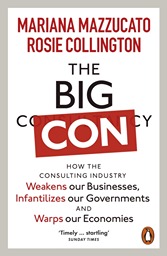Mariana Mazzucato and Rosie Collington
The Big Con
How the Consulting Industry Weakens our Businesses, Infantilizes our Governments and Warps our Economies
There is an entrenched relationship between the consulting industry and the way business and government are managed today which must change. Mariana Mazzucato and Rosie Collington show that our economies’ reliance on companies such as McKinsey, Boston Consulting Group, Bain & Company, PwC, Deloitte, KPMG and EY stunts innovation, obfuscates corporate and political accountability and impedes our collective mission of halting climate breakdown. The Big Con describes the confidence trick the consulting industry performs in contracts with hollowed-out and risk-averse governments and shareholder value-maximizing firms.
It grew from the 1980s and 1990s in the wake of reforms by both the neoliberal right and Third Way progressives, and it thrives on the ills of modern capitalism, from financialization and privatization to the climate crisis. It is possible because of the unique power that big consultancies wield through extensive contracts and networks – as advisors, legitimators and outsourcers – and the illusion that they are objective sources of expertise and capacity. To make matters worse, our best and brightest graduates are often redirected away from public service into consulting.
In all these ways, the Big Con weakens our businesses, infantilizes our governments and warps our economies. Mazzucato and Collington expertly debunk the myth that consultancies always add value to the economy. With a wealth of original research, they argue brilliantly for investment and collective intelligence within all organizations and communities, and for a new system in which public and private sectors work innovatively for the common good.
We must recalibrate the role of consultants and rebuild economies and governments that are fit for purpose.
Mariana Mazzucato is Professor in the Economics of Innovation and Public Value at University College London, where she is Founding Director of the UCL Institute for Innovation & Public Purpose. As well as The Entrepreneurial State, she is the author of The Value of Everything: Making and Taking in the Global Economy (2018), and Mission Economy: A Moonshot Guide to Changing Capitalism (2021). She authored the report on Mission-Oriented Research and Innovation in the European Union, and authored a report with the UN’s Economic Commission for Latin America and the Caribbean (ECLAC) on Transformational Change in Latin America and the Caribbean.
Rosie Collington is a PhD candidate at the UCL Institute for Innovation and Public Purpose, where she researches the political economy of outsourcing. She has written on consulting and other subjects for publications including The Guardian, OpenDemocracy and the Independent. Her academic research has been published by New Political Economy and the Institute for New Economic Thinking.







